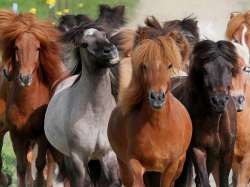4 horses test positive for glanders in Chhattisgarh
In response to an urgent letter from People for the Ethical Treatment of Animals (PETA) India, regarding a report that the deadly zoonotic disease was detected in horses in the state, the animal husbandry department of Chhattisgarh issued a circular notifying the municipal corporation areas of Durg and Rajnandgaon as 'controlled areas', imposing restrictions on movement of equines in and out.

Four horses have tested positive for glanders - a highly contagious and often fatal zoonotic disease - in Chhattisgarh's Durg and Rajnandgaon, and the state administration has imposed restrictions on the movement of equines in and out of the two areas.
One horse tested positive for glanders in Durg, and three horses tested positive in Rajnandgaon.
In response to an urgent letter from People for the Ethical Treatment of Animals (PETA) India, regarding a report that the deadly zoonotic disease was detected in horses in the state, the animal husbandry department of Chhattisgarh issued a circular notifying the municipal corporation areas of Durg and Rajnandgaon as 'controlled areas', imposing restrictions on movement of equines in and out.
The circular directed that all disease-hit equines in the 'controlled area' of minimum 5 km radius be euthanised. It also directed that all equines in the 'controlled area' and 25 per cent of the equines beyond the 'controlled area', up to 25 km (5-25 km) be screened.
As per the circular, beyond 25 km, in all 27 districts of the state, the district animal husbandry department must undertake a physical or sero- surveillance programme for the equines.
It states that provisions of the Prevention and Control of Infectious and Contagious Diseases in Animals Act, 2009 must be implemented mandatorily, a PETA statement said.
In its letter, PETA India had urged the state government to ban the use of horses for weddings and other ceremonies, citing the potential and possibly fatal threat to humans who come in contact with infected horses.
"Horses forced to pull overloaded carts and paraded during weddings commonly face being controlled through the use of weapons like spiked bits fitted into their mouths, thirst, malnourishment, untreated injuries, and other pain, and now their use is exposing Chhattisgarh's citizens to the risk of dangerous zoonotic diseases like glanders," Manilal Valliyate, veterinarian and CEO of PETA India, said.
Glanders is a contagious, fatal disease in horses, mules, and donkeys caused by the bacteria Burkholderia mallei and characterised by the serial development of ulcerating nodules commonly found in the upper respiratory tract, in the lungs, and on the skin. Humans may become infected with the disease through contact with infected animals or inhalation, and it can affect the skin, the lungs, and the entire body and, in the absence of proper treatment, can lead to a painful death.
Also Read | Animal ambulance rescues two-month-old ailing lion cub from Gir forest in Gujarat
Also Read | PETA moves court seeking ban on elephant 'joy rides' at Jaipur's Amer Fort
Also Read | Thailand's beloved baby dugong dies of shock, plastic in stomach